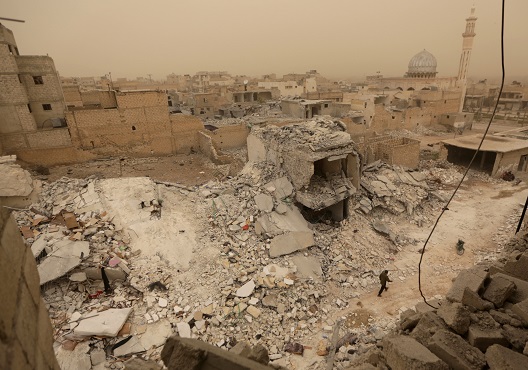 Nearly six years of conflict have dramatically altered Syria’s economy. To better understand these changes, SyriaSource interviewed Rashad al-Kattan, a researcher on Syria, about the state of Syria’s economy. His responses give insight into how, even as the Syrian regime is winning on the military front, the long-term economic challenges paint a more complex picture about whether it can stabilize the country, and the difficulties the international community will face when considering reconstruction.
Nearly six years of conflict have dramatically altered Syria’s economy. To better understand these changes, SyriaSource interviewed Rashad al-Kattan, a researcher on Syria, about the state of Syria’s economy. His responses give insight into how, even as the Syrian regime is winning on the military front, the long-term economic challenges paint a more complex picture about whether it can stabilize the country, and the difficulties the international community will face when considering reconstruction.
Would Bashar al-Assad be willing to work with the United States on reconstruction? And if so, how do you suggest the United States approach working with it?
Despite its anti-Western rhetoric, the regime is aware that the United State is the only nation able to foot the reconstruction bill in the face of little material economic support from Russia, Iran, and China aside from short-term material and military support. Unnamed Arab security sources told the Financial Times in mid-2016 that Syria had cost Iran between $600-$800 million a month between 2013-2014. This figure has likely increased considering the expanding footprint of Tehran in the Syrian conflict. Despite the substantial sums, these have been primarily targeted towards short-term financial and military support. Bashar al-Assad’s recent media interviews indicate that he is eagerly anticipating some of form of re-engagement with the Trump administration that is narrowly focusing on fighting terrorism which is a continuation of the Obama Syria policy. Bashar indicated his government’s willingness to work with the Americans to fight terrorism if the latter coordinates with it, a long-standing Russian demand. The prevalent view in Damascus is that the “regime change” project is no longer viable, and it is a matter of time before the West, especially the US, resets its Syria policy not just politically and militarily, but economically.
Even before the failed Turkish coup attempt, the West and specifically Europe turned a blind eye to increasingly autocratic practices for better cooperation with Ankara to stem the flow of refugees. While the situation in Syria is much worse, it seems the European Union is willing to pursue a similar track there for the false hope of better regime cooperation and compromise to reach a political settlement. The EU’s eagerness and perhaps desperation will further embolden the regime, and give it less incentive to engage in a genuine political process.
Both the Obama and Trump administrations clearly expressed “destroying and degrading” the Islamic State (ISIS, ISIL or Daesh) is a main foreign policy objective. We now have a robust body of evidence that the regime engaged in energy and agricultural deals with ISIL through intermediaries to survive at any cost. The US and EU reacted by imposing new rounds of sanctions against officials, businessmen, and other groups to deter such behaviour – to little benefit. Such behaviour has been superficially interpreted by many as transactional or opportunistic, which has largely undermined the fight against the terrorist group and given it a financial lifeline to keep going.
The radical political changes taking place in the US and Europe means that a re-alignment of agendas with the regime is forthcoming. Damascus does not want to be tied to a political agreement and has been largely working to shift the world’s attention to humanitarian aid and reconstruction as a way of restoring its international legitimacy.
Conditionality of aid and support is typically non-existent in the region, and most visibly seen in US financial and military support to Israel, Egypt, Jordan, Saudi Arabia, and even Morocco. So when discussions of aid start, the choice becomes binary: between aid or no aid. But there is a third way of pursuing conditional aid, especially in the Syrian context where the regime’s survival exclusively hinges on external support. Western countries and especially the US should attach very clear conditions to any future reconstruction aid to the winners of a political settlement that cannot conduct extra-constitutional or judicial activities at the expense of their opponents. Assistance must come with explicit demands that the regime cannot engage in unilateral activities without engaging with other local stakeholders. International and regional powers have conducted their foreign policy and aid without paying attention to the behaviour and policies of recipient governments that have turned increasingly autocratic. Such governments and regimes have become accustomed to such practices without having any semblance of accountability.
While the focus has been on US policy towards Syria, specifically in the diplomacy and military arena, the EU is a significant stakeholder in the economic sphere. Before 2011, the EU bought 95% of Syria’s oil exports (with Total and Shell as the main foreign energy operators), which made 90% of the state’s foreign currency income. As the EU and the US increased pressure on the regime, economic sanctions left the regime in dire straits. One way the EU can play a positive role in stabilising the conflict is by offering economic financial incentives. These incentives have yet to be met with genuine engagement from the regime to address the underlying issues of the conflict.
Rashad al-Kattan is a political and security risk analyst, and a fellow with the Centre for Syrian Studies (CSS) at the University of St. Andrews.
Image: Photo: A man walks on the rubble of damaged buildings in the northern Syrian town of al-Bab, Syria March 10 2017. REUTERS/Khalil Ashawi

